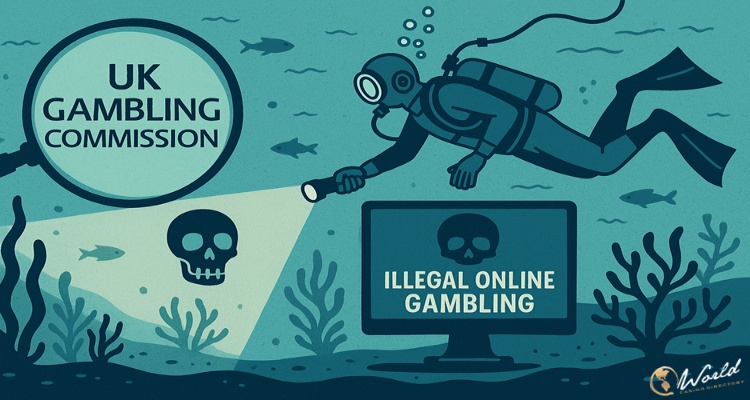The UK Gambling Commission (UKGC) has concluded its four-part research project on illegal online gambling, revealing persistent difficulties in accurately assessing the scale of the black market. The final report, Estimating the Size of the Illegal Online Gambling Market, compiles months of analysis into consumer behaviour, risk assessment, and enforcement efforts, while underscoring how limited data continues to hinder reliable market estimates.
Complexities of Quantifying a Hidden Market
The Commission stated that measuring the size of the illegal online gambling market remains methodologically complex, with data limitations and necessary assumptions undermining confidence in any single estimate. It compared these challenges to those encountered by other government bodies attempting to assess illicit trades, such as the illegal tobacco market.
The UKGC explored three methods for quantifying illegal gambling activity: the dwell time approach, which converts player engagement data into spending estimates; the channelisation approach, which compares regulated and unregulated market participation; and a survey-based approach. However, it pursued only the first two methods after deeming survey-based data unreliable due to poor consumer recall of past gambling expenditure.
Both the dwell time and channelisation approaches presented valuable insights but ultimately fell short of producing a definitive figure for the size of Britain’s illegal market. “Dwell time approach allows us to attempt to convert objective estimates of engagement data using known data from legal market,” the report noted, while acknowledging that “further work on these actions is required before we will reach a position where reliable estimates can be published.”
Using the dwell time method, the Commission reviewed the activity of 117 players who engaged with illegal gambling websites. Sports betting proved to be the most popular activity, accounting for 34% of participants, followed by bingo at 14%, and both slots and instant win games at 13%. The UKGC cautioned that the small and unrepresentative sample limited the reliability of these findings.
Methodology
The regulator also examined “Patterns of Play” data within the legal market, which revealed an average gross gambling yield (GGY) of £1.12 per minute for casino games and £0.32 for slots based on 2018–19 data—figures now considered outdated. A more recent dataset showed online slots GGY per minute remained stable between 2020 and 2025, reaching £0.24 as of March 2025.
Meanwhile, the channelisation method required verification of web traffic and app usage data to ensure accurate estimates. The UKGC compiled a list of licensed operators and used analytics from SimilarWeb, though it recognised key limitations—particularly the lack of insight into app-based engagement for illegal websites. The regulator emphasised the need for cooperation from licensed operators to validate data accuracy.
It further noted that even small variances in channelisation estimates could significantly alter financial interpretations. For instance, based on an annual GGY of £6.9 billion from April 2023 to March 2024, a 0.5% deviation could equal £34.5 million.
Strengthened Evidence Base, Continued Uncertainty
Despite the absence of a conclusive figure, the UKGC said its research has improved understanding of how illegal operators function and why consumers engage with them. Findings show motivations vary widely—ranging from lack of awareness that a site is illegal to deliberate avoidance of the regulated market due to self-exclusion or restrictions.
Importantly, there was no evidence of sustained growth in illegal market participation in areas where data exists. The regulator stressed that while much activity occurs beyond its oversight, the risk to consumers and the regulated sector remains considerable.
Chief Executive Andrew Rhodes commented: “Illegal online gambling remains a serious threat to consumers and to the integrity of the regulated market. While measuring the full scale of the problem is complex, our understanding is growing — and so too is our ability to disrupt illegal operators. Our independent research has strengthened the evidence base, improved transparency, and underlined that progress depends on a collective effort across sectors.”
In the report’s conclusion, the UKGC outlined plans to continue research and enforcement activities. Future work may include analysing VPN usage trends, tracking search activity for unlicensed operators, and revising engagement models with updated data from licensed operators.
Commitment to Continued Research
Director of enforcement and intelligence John Pierce added that the regulator is enhancing its intelligence capabilities through partnerships across financial, technological, and regulatory sectors. “Illegal gambling is not a static threat,” Pierce said. “It is adaptive, opportunistic and increasingly embedded in digital ecosystems on the international stage. Through targeted disruption, strategic partnerships and continued investment in capability, we are building a resilient and effective framework to protect consumers and uphold the integrity of the regulated sector. We are making progress; and we are committed to going further.”
Although this report concludes the series, the Commission confirmed on its website that further updates will follow as ongoing research and enforcement evolve. The initiative reflects a long-term commitment to understanding and countering illegal gambling through collaboration and evidence-driven strategy.



